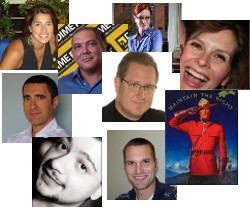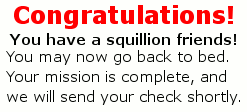
There are some blogs I feel bad to neglect, yet delighted when I make time for them. They are the blogs where I intend to be more active, and I want to share some of those with you. These are blogs by people who truly understand the many good reasons to blog, and they work hard to be useful to their communities.
First, I want to explain a bit about why I am recommending these blogs, and how I think you can learn a lot from them. If you don’t have time read, just hit the play button (top of page) to flip on my podcast and skip right to the list.
Did you ever go to a blog and find that the other people there were actually communicating with you? I don’t mean just a short and pithy answer, but rather an actual conversation that takes place. I mean the kind of blog where you see the same people every time, answering questions, solving problems, sharing ideas, and actually conversing just like they would in a coffee shop, or over lunch.
I know some blogs like that, and I enjoy them very much. It is not only because of their topics, either … I enjoy the people. Of course, I don’t spend a lot of time with blogs about things which don’t interest me, but if these blogs were about termite ranching or how to grow poison ivy, I would still be there … time permitting. I learn from them, and on good days, they learn from me.
Take a Lesson from These Blogs!
If you have ever wondered why your blog is not as active as you would like, as a community filled with familiar faces who subscribe and come back regularly to read your work, there is probably a good reason. If it is filled with stuffy language about your industry, it will make many people yawn. If it is packed with a bunch of “buy this now” language, it will make people feel like the vacuum salesman just arrived at the door.
News Flash: It is easy to throw you out and slam the virtual door on you. All it takes is a click! If you want to avoid that “click” of people throwing you out the door, I suggest doing some reading and participating. Yes, of course I want you to read every one of the 300+ articles in my blog archive, and I want you to share your thoughts on every last one of them. I also want to help you to meet others to inspire you, teach you, and keep you moving forward.
If you want to learn how to build a blog community where people come to read what you have to say, and to see what all their friends are up to, take a lesson from the blogs listed below. I am not listing them in a specific order, or even by their topic. I am lumping them together as blogs where you can meet and get to know great people … people you will probably like. In fact, if you like my blog, and if you like me, you will find a lot of similar thinking people in these blogs.
These are blogs where people interact, learn, and share ideas. Some of them represent overlapping service offerings, but they don’t compete … they collaborate. They are blogs where people come together, and not just to spam a link to their website, or wear people down by being a blog troll. They are blogs where the community is consistent, and where that kind of thing would be pinched off like a wet turd.
A couple of these may not have the highest level of community involvement, but in those cases, I listed them based on the people writing them, and their involvement elsewhere in blogs. I read these blogs and pay attention as much as time permits, and they are on my RADAR … right near the center.
How Do These Bloggers Do It?
I am an observant guy. In fact, it is an important part of my job to be observant. A commonality I see in these blogs is that they each have a lot of the same people. This makes it pretty obvious that it is not all just about the topic of a specific blog, but largely about the people. They meet and interact across many blogs, and it becomes very social. After all, this is social media we are talking about. So let’s be social, people!
You will see many of the same people commenting and interacting with each other at several of the links I will provide. It is not some kind of secret club with a membership application. The application is just to come and get to know people and not act like the new kid in town who has to prove that his bicycle is faster than the local kids. These are very real and human communities that represent the greatest value of online communications. They are about the people, and not about the technology that so many people treat the Internet as.
Why Building Your Blog Community Matters
Let’s look at this from a business standpoint. A lot of business blogs focus on how to get people to buy their stuff. They want brand recognition, and they want a return on their investment of blogging. That is the focus of a business … more business. A common, yet tragic result is that they overlook the even greater value in finding people who love, love, love them enough to recommend them to every friend, acquaintance, and complete stranger. Those other people are the ones you want buying your stuff!
Do you want to know why the friends, acquaintances, and complete strangers matter more? They add up … huge! There are multiple reasons, and I will give you some examples.
I will use myself for the first example. If you think you want to sell me something, just imagine how much more potential you have of selling your goods or services if you make me a fan and I spread it to the squillion people I encounter and who read my blog, my Facebook, my Twitter, and my honorable mentions of others. You don’t really just want to sell me something do you? Sure, maybe that is good enough if you are short sighted in your marketing, but the real value is in my community. If you grab my attention with your community, my community becomes your community. Now doesn’t that sound nice?
Neglecting and Irritating vs. Cultivating and Nurturing
Now, to snap you into a seriously messed up potential reality, consider what happens if you are doing this all wrong. How tragic it is if, instead of making me a fan, you creep me out. Maybe you come and lurk around my blog, and maybe even get comfortable enough to spam my readers.
What if you never took the time to know more than just that my blog ranks really highly for a squillion different industry terms, and you want to throw your name and website link in my comments. Consider the example of a company that does not comprehend the value of community, or how to work with others. I made a case study of a company called “Suture Express“. Search Google for Suture Express (Google search) if you don’t already know that story. I hold roughly half of the top 10 listings on Google for their company name and the names of each of their corporate officers. Trust me, it is not the stuff that helps companies sell more, but it is what happens when companies get SEO and social media all wrong, and ignore the value of building their network, and working within a community.
It is my community that slaps the piss out of companies who cheat, lie, and spam. Companies such as Suture Express and Ray Skillman Auto Dealerships simply cannot match the power of a community.
Why do I tell you this? Because it shows the value of community, and the value of having more people who know you, like you, and defend you than you have people who are indifferent, or even despise your brand.
What if They Say You Are an Awesome ‘Possum?
Next, I want you to consider how much more valuable it is for somebody else to say you are awesome than when you say you are awesome. As an example, I will say it right now … I am awesome! I am awesome like sex, bacon, and a cold grape soda. Awesome is my job. In fact, my new mantra is this: “My job is to create marketing as awesome as sex and bacon. Even when I fail, it is at least as good as ham and a hand job.”
Fine, some people will believe it if you say you are awesome. Some people will do the research to see that it is true, but there is still a much better way!
Now consider how valuable is it if somebody else says “Mark is awesome!” It kind of sounds more valuable then, right? There is an implied credibility when it comes from a third party. I hope you get the point.

Is Your Blog Community a Waste of Time?
When you hear words like “blog community”, it may seem like a completely crazy concept. It may almost sound impossible, or a complete waste of time. Where does it begin? Where do those bloggers meet all these great people?
Building your community will not happen very efficiently if you are just sitting there staring at your own blog waiting for people to come and add their comments or to send their friends. It will happen when you get out of your shell and make time to meet people elsewhere. Spamming your blog to anybody and everybody will not help, either. I could write a squillion page dissertation on that formula for failure. Here is some thought candy on the topic for you to consider: “How to Comment on Blogs and Why You Should (or Should Not)“.
The SEO lies you may have heard will not help you, either. Good SEO (search engine optimization) happens when people such as some of the ones listed below whip out their keyboard and say the equivalent to “Mark is Awesome” about you.
Awesome Bloggers Who Attract Other Awesome People
If you want somebody to say that you are awesome, you had better get started building a community. I said I have some blogs to list, and I don’t plan to let you down. Here are some good people to learn from. Watch them, get to know them, and meet the great people who contribute to their blogs. Find out why I took the time to commend them. If you do that, you will better understand the value of reaching out of your shell, and why building a community by participating instead of siting like a bump on a stump is worth every bit of the effort.
Ingrid Abboud’s Nitty Griddy Blog

Ingrid Abboud (a.k.a. Griddy) shows many signs of being nothing short of awesome. She is a great connector of like-minded people, and deserves the description I once gave her of “sweet, silly, and super smart”.
In a recent version of Ingrid’s “Superpost Sunday Weekly Roundup“, the blog is compared to Central Perk from the hit television show, Friends. It really is that kind of a place where all we need is Gunther the barista to bring coffee and we are all set. Do you make a great cup of coffee? Read this blog and find out why it is loved by many, and nobody is a stranger.
Erika Napoletano’s Redhead Writing

Erika Napoletano is a witty, intelligent, outspoken blogger who is a bit aggressive by some measures. I like her. In fact, I like her a lot.
Erika recently landed a gig writing a business column for Entrepreneur Magazine, and her rants draw people to communicate, for better or worse … usually better. You can give her a hard time about how loose she is with dropping the F*bomb, but she knows how to bring a crowd to their feet.
Considering that she is the author of “The Bitch Slap”, there should be little wonder about Erika’s free spirited style.
Mark Harai’s Blog: Define. Imagine. Master. Execute.

Mark Harai is a great guy. He lives in Costa Rica and, I’m not sure if he knows it yet, but I die just a little more every time he is on a beach while it snows here in Kansas.
Mark is the father to a squillion kids (actually just seven), and he is one of those guys you just know this kind of stuff about … because you like him. His likability sets him apart from others, and his blog consistently offers up thought provoking articles about business growth and better human relations.
When I find more time to break away, I will meet up with Mark for a tour of his local beaches. For now, we have the Internet.
John Falchetto’s Expat Life Coach

John is very active with several of the blogs in this list, and a heck of a cool guy. Here is his take on being active within the communities he supports: “Why commenting isn’t for you“.
If you can’t like a guy like John Falchetto, your problems are much worse than blogging.
One day, when I make it back to France, or he makes it here to USA, we will go and enjoy a day at the gun club. Until then, we will enjoy our two-way communications across multiple blogs we each frequent, as well as Twitter, Facebook, and anywhere else I can track him down.
Mark Schaefer’s {Grow} Blog

I have made a number of interesting trips to Mark’s blog, and I am a bit guilty of lurking without jumping in with my comments. I am not sure why this is the case. I am doing the same thing I wish people wouldn’t do with my blog (keep their thoughts to themselves).
We have a lot of the same friends, and I hope to get to know Mark more and become more active at his blog. A recent visit turned up this article titled “How do you REALLY build a blog community? A love story.“
If you like my community, I think you will like Mark’s as well.
Gini Dietrich’s Spin Sucks

This is another of those people, and blogs that I am a bit ashamed to neglect. It is all my fault, but it is on my “To Do” list, and blinking away on my RADAR.
Have a look at this recent article titled “Executives and the Ostrich Syndrome“ It is so sickeningly familiar to me that I didn’t even know how to reply … but I plan to … when I stop procrastinating.
Spin Sucks … and Gini knows it! Check her out and find out why I respect her work.
Ruhani Rabin’s Technology, Lifestyle, and Interestingness

Ruhani does not blog as much as he used to, but I like him, and I like his style. I have to give him a serious shout out here, because of his active participation across multiple social media channels. He has built a community that sticks with him wherever he goes, and whether he blogs often or not.
What do I really think of Ruhani? Well, I can say this: Ruhani is one of only a few people I put on the back cover of my 2009 book “Twitter for Business: Twitter for Friends“, and not just because he said something nice about me.
It seems very appropriate that Ruhani is VP of the company that created “Friendster” (friendster.com), because he sure knows how to make friends. Ruhani Rabin is one of the most friendly guys with a blog you could ever know.
Marcus Sheridan’s, The Sales Lion

Some call him Mufasa. Actually, maybe only Griddy (Ingrid Abboud) calls him that, but most call him Marcus. I don’t directly communicate with Marcus very much. I am not sure just why that is the case. I hope it is not because I gave HubSpot a harsh review once upon a time. I know he is pretty tight with HubSpot.
We bounce into each other on a lot of the same blogs, and we have a lot of mutual friends and acquaintances. I read his blog, time permitting. I kind of feel like I know him. That is a mark of a blogger who “gets it”.
Here is a recent article by Marcus about building a blog community: “Massive Blog Growth: Do You Really Have the Time it Takes?”
Jim Rudnick’s Canuck SEO: Canadian SEO for Google Success!

Jim Rudnick is one of those guys who soaks up information like a sponge. He is an “old-timer” like myself, who has been in the SEO business since most search engine optimizers were in diapers, eh?
Of course, with Jim being a Canuck, he feels more comfortable if you end each sentence with an “eh?” You know, because that’s what they do up there in Canada, eh?
Jim is active across many channels of social media, outside of his own blog, and because of that, I think it would be awesome to see Jim’s own community at Canuck SEO grow like a weed. Jim gives more than he takes, and you can find a lot of great blogs just by keeping a close eye on him.
Here is a recent article by Jim: “Affiliate Scams: I Must be Lost!” Stop by and say “hi, eh?”
My Summary:
I don’t read every article from every blog I subscribe to. I also sometimes forget to subscribe to some of the blogs I encounter. I have found many great blogs over the years, and I simply cannot read and respond to everything on the Internet. I try my best to keep up with the good ones, and I try to participate in the community, as my limited time allows. I will be working on this, and trying to give closer attention to these blogs. I hope that you will, too.
Now that you have the list, and I gave you some thinking points about working as a community, are you going to sit there like a bump on a stump, or are you going to kindly introduce yourself to my community of readers? You may just end up being the tenth blogger on the list. Go ahead … impress me!
Podcast: Play in new window | Download












